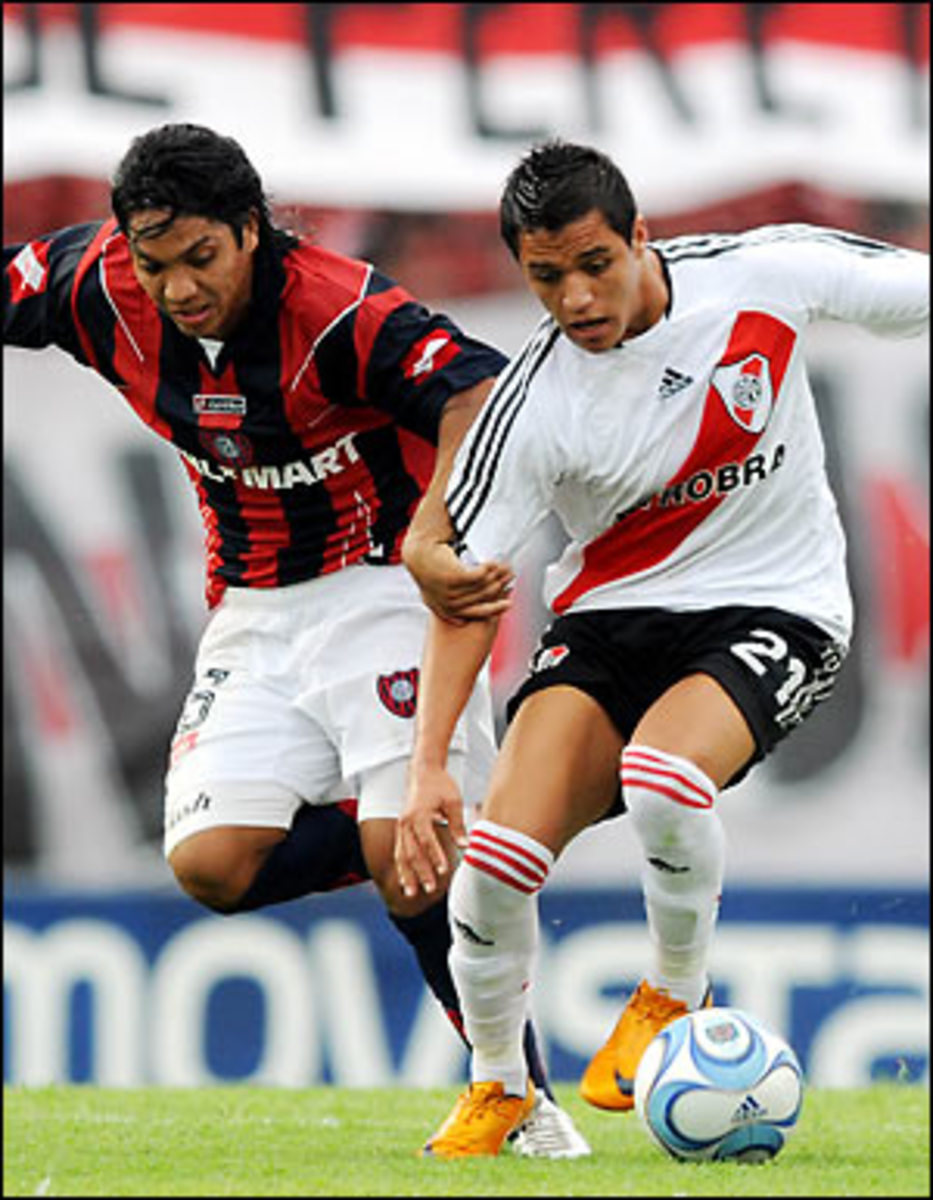Stalling in the gates
When San Lorenzo kicked off 2008 -- its 100-year anniversary -- its players knew they would be expected to challenge for a major international title. The Argentine club targeted South America's ultimate prize, the Copa Libertadores.
But to achieve that, it would have to overpower 32 of the continent's best clubs, and that meant it would have to reinforce its squad with quality at every position.
San Lorenzo did just that. For an Argentine club, it spent big money in the transfer market, bringing several high-profile players back home from Europe, including Andrés D'Alessandro and Diego Placente from Spain's La Liga and Gonzalo Bergessio from Portuguese power Benfica.
Last season, it did the same, purchasing the likes of Bernardo Romeo and Daniel Bilos with an eye on the '08 season.
The club's chairman, Rafael Savino, already counted on Argentina's most respected coach, Ramón Díaz, who was given the responsibility to guiding the club to its first Libertadores title.
But after five matches in league and Copa play this season, San Lorenzo is already struggling to make it out of its group. In its Libertadores debut earlier this month, el Ciclón suffered a disappointing 2-0 loss to Caracas FC in Venezuela, and last week in Buenos Aires, it was held to a scoreless stalemate against Brazil's Cruzeiro, a match it needed to win.
It has been a similar story in the Argentine Clausura. Sunday's 2-0 loss to River Plate was San Lorenzo's third straight league defeat, and the club now finds at the bottom of the standings. The worst part is that, with all the attacking flair in the squad, el Ciclón has yet to score a goal.
The likes of Bergessio, Romeo and the usually effective Andrés Silvera have failed to find the target. Unless they immediately find their best form, San Lorenzo's title ambitions could soon be over before they even began.
The club's lone bright spot thus far has been D'Alessandro. Much was expected of the attacking midfielder when he joined the club from Real Zaragoza, and he hasn't disappointed. In his league debut at home against San Martín, he teased and tormented the opposition with his amazing footwork and acceleration, but his inspiration wasn't enough to save his team from a painful last-minute defeat.
(Worse for San Lorenzo, "El Cabezón" pulled a muscle in his leg last weekend and will be out of action for 15 to 20 days).
But San Lorenzo hasn't been the only Argentine club struggling to find its form this season. For all their usual high standards, the Argentines' form early in the 49th edition of the Copa Libertadores has been nothing less than disastrous.
Out of nine matches played by Argentine clubs so far, only two have been victories. Lanús and Arsenal worked hard for narrow home wins over Danubio and Libertad, respectively, but the other four haven't been so lucky. Estudiantes de La Plata, who find themselves in Group 2 along with Lanús (with whom they drew 0-0 with on Tuesday), were beaten by relatively unknown Ecuadorian club Deportivo Cuenca in their group opener.
Still, the club's inspirational leader, Juan Sebastián Verón, remains positive about his team's chances, and has stated that he will only be satisfied when Estudiantes wins the whole thing. But with only one point from a possible six so far, Estudiantes face a must-win situation at Danubio on March 5 in order to stay in the hunt.
Even reigning Libertadores champions Boca Juniors failed to open their title defense with a bang -- they needed a late Sebastián Battaglia equalizer to rescue a point against Unión Atlético Maracaibo last week. In past editions of the Libertadores, Boca breezed past teams like Maracaibo.
Despite Boca's frustrating debut in Venezuela, los Xeneizes are still heavy favorites to advance out of the group stage. The overwhelming depth in its attacking third is hard to bet against: Juan Román Riquelme, RodrigoPalacio and Martín Palermo (who is just two goals away from becoming the all-time leading scorer in Boca history).
But if Boca doesn't want to experience any surprises, it must get into top gear immediately. Only two teams from each group are assured a place in the next round, and Boca will have to overpower either Atlas or Colo-Colo (two difficult teams) for its spot.
Boca's struggles aren't even the biggest disappointment, though. Without a doubt, the most surprising result early in this Libertadores campaign was River Plate's shocking 2-0 defeat to Universidad San Martín in Lima. The Argentine giants played horribly against a small-time Peruvian club that was founded only four years ago.
River sits in this Libertadores' Group of Death, and unless los Millonarios improve immediately, they could be in for another first-round exit just like last year when they were eliminated after home-and-away losses to Caracas FC.
River's biggest test, and arguably the most important matchup of the group phase, is Wednesday's blockbuster with Club América. River knows that if it doesn't pick up the three points against the Mexican giants in Buenos Aires, its title aspirations could already be over. Much of River's fate depends on the outcome of this match.
Another huge worry for the Argentine clubs is the outstanding form of the Brazilian clubs in the Libertadores. After a total of five matches, teams from Brazil have yet to taste defeat, even in pressure-cooker away matches in Argentina and Ecuador.
But the Argentine clubs can't let this affect them. First they have to concentrate on their own games, and then worry about the teams they may stare down in the decisive stages of the competition. San Lorenzo and the other five Argentine clubs have the potential to reach the next round of the Libertadores -- but it's essential they correct the mistakes they've made immediately.






